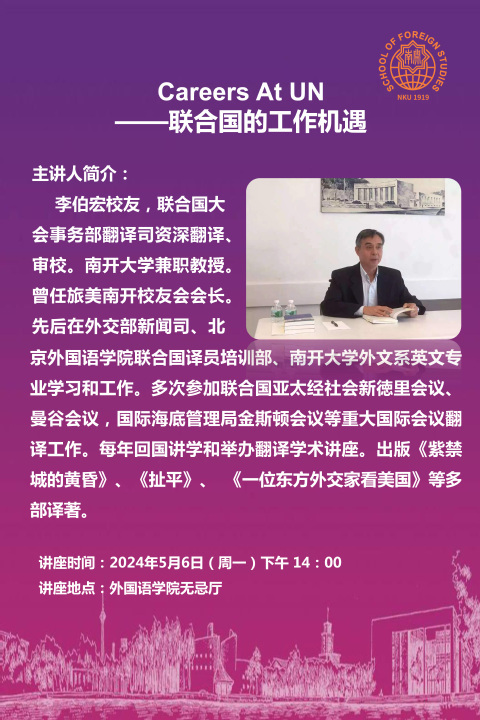On the afternoon of May 6, the School of Foreign Studies conducted a course of“Context and Policy”. Li Bohong, an alumnus of Nankai University and a senior translation reviewer at the United Nations General Assembly Department of Translation Division, was invited to give a lecture. Nearly 1,000 undergraduates from the School of Foreign Studies participated in the learning online and offline.
Alumnus Li Bohong successively studied and worked in the Information Department of the Ministry of Foreign Affairs, the United Nations Interpreter Training Department of the Beijing Institute of Foreign Languages, and the English Department of the Foreign Languages Department of Nankai University. Mr. Li has participated in many major international conferences and meetings, such as the UN ESCAP New Delhi Conference, the Bangkok Conference, and the Kingston Conference of the International Seabed Authority. Li Bohong, drawing on his over 30 years of translation experience, delivered a lecture on the topic of “Careers at the UN—Job Opportunities at the United Nations,” with a focus on the United Nations, UN translation, and the art of translation. At the beginning of the lecture, Li Bohong introduced the historical overview and structure of the United Nations, starting from the signing of the Charter of the United Nations to the main organs of the United Nations, the official languages, and emphasized the crucial role of translation in connecting the globe and communicating with the world. After that, he mainly explained the employment opportunities at the United Nations, emphasizing the job prospects for young individuals within the organization. He emphasized that there are numerous employment opportunities in the United Nations for foreign language students. He explained in detail the UN Young Professionals Program Examination (YPP), the recruitment paths, and application channels for UN-related internships, encouraging them to seize these opportunities, build self-confidence, and actively engage in UN internships and employment.
Li Bohong drew from the characteristics of foreign languages and his own experience translating United Nations documents to introduce practical translation methods and skills to the students of the School of Foreign Studies in a comprehensive manner. He explained the translation strategy using commonly used words and example sentences from the United Nations, such as “access”. He introduced the three stages of translation: interpreting word-by-word without understanding the meaning but not forgetting the form, preparing both the meaning and the form, and emphasized the need for rigor in translation. He also highlighted the importance of addressing the issues related to multiple meanings of words and the fidelity of the translation. The highest requirement of translation is to achieve “both the meaning and the form”.
After the lecture, students asked questions about translation strategies, UN career skills, and job search opportunities, and Li Bohong answered them one by one. The lecture ended successfully with the warm applause of the students.




